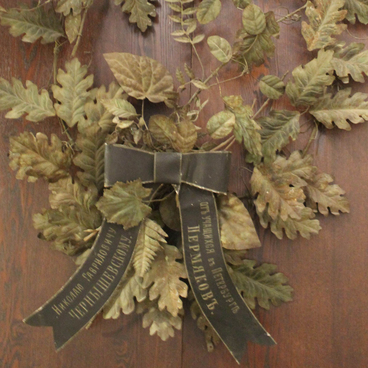In the 19th century, signets with personal monograms were a very popular item. Often, they looked like a real work of art; they were presented as gifts both on the occasion of a ceremony, or for no reason at all. Personal monograms in a letter and small stamps, alongside with high-quality paper, ink and calligraphy made a commonplace letter an item of aesthetic enjoyment.
Mikhail, the younger son of Nikolay Chernyshevsky, was no exception. The museum keeps several signets and stamps with the initials ‘M.Ch.’ One of the exhibits is his signet of smoky topaz made in 1990s. Mikhail then lived in St. Petersburg and was making a successful career in railway administration. He belonged to metropolitan intellectuals of the late 19th century, and the given signet provides insight into the owner’s taste and sense of humor. He had selected the figure of a bear in accordance with his first name: in Russia, the bear is associated with the name Mikhail.
Mikhail Chernyshevsky personally knew the Railway Minister Sergey Witte, and it was the latter who invited him to work in the Railway Department. Mikhail often went on long business trips and wrote letters to his relatives from there: he used the signet with the bear to seal envelopes.
The younger son of the revolutionary writer lived a difficult and eventful life. Having no university degree, he independently acquired extensive knowledge in various areas. His exclusive industriousness and open-mindedness contributed to the fact that he became one of the first scholars of the professional and personal life of his father.
Vladimir Bonch-Bruevich believed that Mikhail Chernyshevsky belonged to progressive publishers of the czarist time who “invested not only their money but also their soul” without making any personal profit. He wrote that Mikhail “contributed so much to the collection of the works by Nikolay Chernyshevsky, that our literature <…> cannot but pay utmost deference not only to N.G. Chernyshevsky, but also to his son”.
Collecting and research activities, commemoration of Nikolay Chernyshevsky made the writer’s younger son a famous museologist and a distinguished scientist. His contemporaries were surprised with his ‘amazing industriousness and indefatigability’ in his scientific and propaganda efforts.
Mikhail, the younger son of Nikolay Chernyshevsky, was no exception. The museum keeps several signets and stamps with the initials ‘M.Ch.’ One of the exhibits is his signet of smoky topaz made in 1990s. Mikhail then lived in St. Petersburg and was making a successful career in railway administration. He belonged to metropolitan intellectuals of the late 19th century, and the given signet provides insight into the owner’s taste and sense of humor. He had selected the figure of a bear in accordance with his first name: in Russia, the bear is associated with the name Mikhail.
Mikhail Chernyshevsky personally knew the Railway Minister Sergey Witte, and it was the latter who invited him to work in the Railway Department. Mikhail often went on long business trips and wrote letters to his relatives from there: he used the signet with the bear to seal envelopes.
The younger son of the revolutionary writer lived a difficult and eventful life. Having no university degree, he independently acquired extensive knowledge in various areas. His exclusive industriousness and open-mindedness contributed to the fact that he became one of the first scholars of the professional and personal life of his father.
Vladimir Bonch-Bruevich believed that Mikhail Chernyshevsky belonged to progressive publishers of the czarist time who “invested not only their money but also their soul” without making any personal profit. He wrote that Mikhail “contributed so much to the collection of the works by Nikolay Chernyshevsky, that our literature <…> cannot but pay utmost deference not only to N.G. Chernyshevsky, but also to his son”.
Collecting and research activities, commemoration of Nikolay Chernyshevsky made the writer’s younger son a famous museologist and a distinguished scientist. His contemporaries were surprised with his ‘amazing industriousness and indefatigability’ in his scientific and propaganda efforts.
